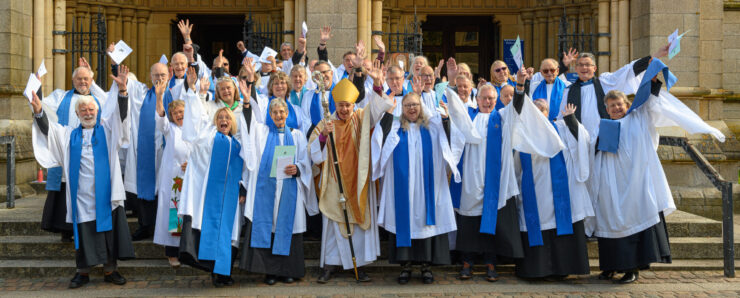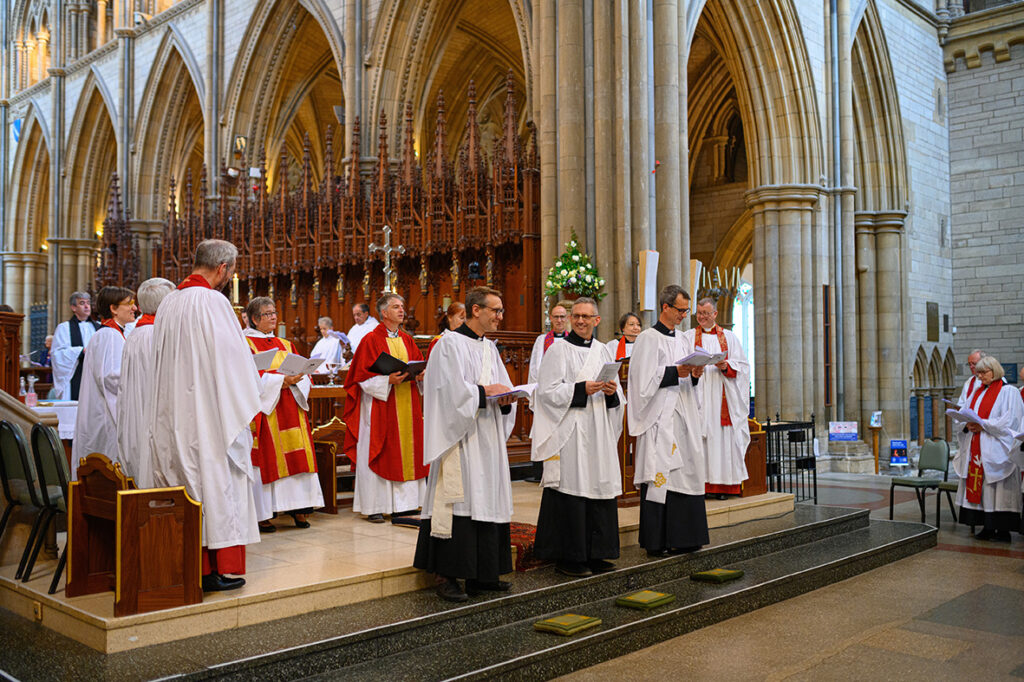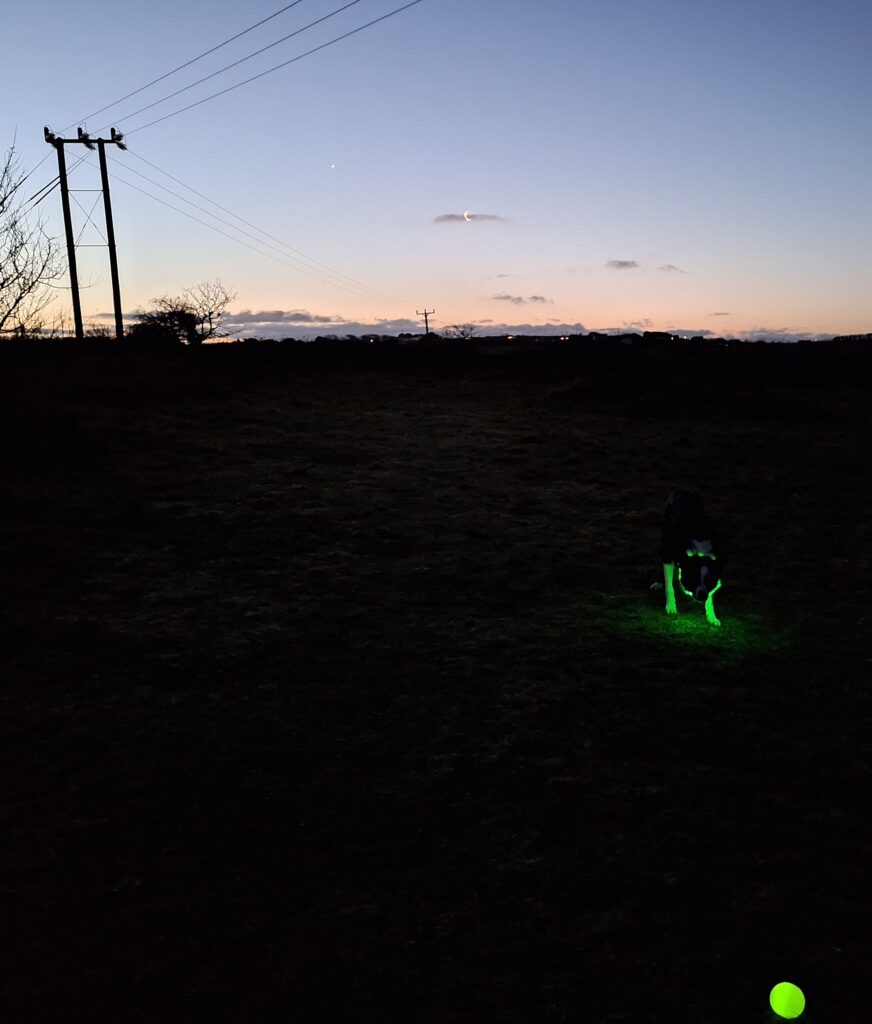Dear One and All
First, a bit of context for part 2 of this blog- there may well be a part 3!
Why did the subject come up and why would I, as chaplain, write about it?
I trained as a Reader back in 1986, beginning a two-year (ish) course with a designated local tutor and with lectures and courses in Truro occasionally with such folk as the wonderful Canon Peter Boyd. I was in my late 30s, a deputy head in a primary school and with two young children. I was able, thankfully to do the work in chunks, not doing any of the work at really busy times at school but ticking off the study and essays in holiday times. My last blog questioned really whether it would have been possible for me to complete Reader training with the requirements of the course today and that, along with many conversations with experienced Readers was the premise. I meant no criticism of the current course; it does a wonderful job for those who attend it who have the time, stamina and motivation to complete it. There are some inspirational tutors who go out of their way to support students with all sorts of issues from dyslexia to periods of bereavement. But still the question remains, is it a course better suited for those nearing retirement, or those who are not in full time paid employment?
As a journal tutor for a number of years, contributor to the post licensing days and chaplain to the training course before that, I am in a position to hear about how readers feel from all sides and I have pondered these problems for the past decade.
When I meet with Readers, as I often do, at events, in telephone conversations and the Zoom Monday morning chats it is often commented that Reader numbers are decreasing, the numbers being licensed are decreasing and more and more readers are moving across to the path of ordination, feeling called to plug the gaps left by decreasing clergy numbers and reorganisation within the deaneries.
So……… I still think it fair to ask whether we are a dying breed.
I am Reader and licensed Lay Ministry is what I do, teaching, preaching and encouraging every-day faith and I do think we need a solid grounding academically to do that job. However, Readers in our patch have a wide range of training experiences, many of which are certainly not as rigorous as the current model- which is not a criticism of the current model, merely an observation.
Anthony White contributed the following reflection which I think is a helpful addition to the debate.
Chaplains Blog Re: Are Readers a Dying Breed?
Your thoughts about Reader training certainly got me thinking, particularly as a newly-licensed Reader. So, after some reflection, here are my thoughts and musings…
…In terms of context, I am a father of two teenage boys. I also worked full-time whilst studying with SWMTC. I found the course demanding and challenging; yet also vibrant, exciting and fulfilling. And to be honest, I wouldn’t have expected anything else. If we are to call ourselves Readers or Licensed Lay Ministers then we need to be suitably trained and skilled in what we are being called to do. Generally, I found the study manageable because I followed the advice that SWMTC gave me regarding priorities (family-work-study) and that I purposefully stepped away from any of my church roles – another important piece of SWMTC advice.
Whilst nothing is ever set in stone (other than death and taxes), I would say that the current training is (given the challenges of part-time study) very much fit for purpose – even more so now than it was when I was studying. I think the reframing of the Formation Programme so it is now in tune with the Reader ‘grids’ is an excellent decision and reminds me of the strengths of my own teacher-training.
We worked, laughed and learnt alongside Exeter students and I don’t really recognise the “Exeter-centric approach” you mentioned in the post. My study was blessed by Cornwall-based tutors as well as those from Exeter Diocese. I also found that studying with a community of similar, but different learners very rewarding. I learnt much from studying alongside Ordinands, those called to the Distinctive Diaconate as well as other Readers/Licensed Lay Ministers from across both Diocese. In fact, learning alongside these different vocations helped to reinforce my understanding of my own vocation.
Whilst Readers lead worship, we are not just Worship Leaders (albeit an important ministry in itself). We are called to be Community Theologians, those who (as you rightly say) teach, preach and encourage everyday faith. Reader training, I believe, gives us the learning and the authority to do this. We insist on sufficient knowledge and expertise in our school teachers and I think we should demand similar in our church teachers. Additionally, being a Lay Reader/Licensed Lay Minister is a nationally recognised and valued vocation and thus a common award certificate is important. I am fortunate to work closely with two other Lay Readers, and I am certain our successful working is, at least in part, strengthened by training underpinned by the Common Award Certificate training. Such training will also provide checks, balances and standardisation across the Church of England, which, I’m sure we’d all agree, is a good thing.
I agree that it is wonderful so see the different lay ministries across the Church of England and especially within Truro diocese. I do wonder whether Reader numbers might be dropping because these new ministries are offering a wider range of vocational pathways: vocations which previously would only have been fulfilled through Ordination or Lay Reader licensing – or, maybe, not at all. I wonder, how many people in the past, lived an unfulfilled vocation? Rather than seeing these lay ministries in competition with Lay Reader training, and each other, it’d be interesting to see what the overall growth in lay ministry vocations has been. I’d like to think that through each complementary (and not competitive) ministry pathway, God’s grace pours through. Are we the dinosaurs of the church? Only if we let ourselves become so.
Nevertheless, I do think the National Church needs to consider how it supports those undertaking Reader training. Given that SWMTC trains Readers and Ordinands alongside each other, it did frustrate me that Ordinands were eligible for a book allowance whilst Readers weren’t. This did feel plainly unfair.
I also think that the Diocese needs to review the pre- and post-licensing training it offers: I have now completed four years of FICM/SWMTC/Post-licensing training (I also completed Worship-Leader training before that). I do like your suggestion of a flexible course where individuals could map out their own path and would suggest that post-licensing training should reflect this approach.
Thanks for the opportunity to reflect on my study, both with SWMTC and with the Diocese. Best wishes Anthony White
Mary and Claire who are currently in training staunchly defended the current course and I include some of their comments to add to the discussion which are really helpful. My thoughts after reading their responses is whether we need some sort of multi-faceted and flexible approach to training so that those who feel they can thrive on the present model can do so while others who are in a different situation as far as age, occupation and time can embark on a different path to licensed lay ministry.
Mary writes:
We are two of the three readers-in-training from Truro in our second year at SWMTC.
I don’t really agree that there is a problem with training with people from Exeter Diocese – that has been fun and interesting. The more people we think with the better, as far as I am concerned. It also gives us access to a wide range of staff expertise.
Also fitting in with common awards is important so that our training is valid and standardised across the country. I would be reluctant to train in a way which limited my ministry to Truro (as you may remember, that has already happened to me with my training in Rochester).
The summer placement is not too long if you are organised.
Obviously the course is not perfect and it is intensive. It is true that course content is adapted for ordinands who are already readers, as you surmise.
I wonder if you might have done a bit more research before making some of your comments.
As for your questions at the end. The future of reader ministry is beyond my pay-grade, I do want a nation-wide accreditation. The SWMTC course is flexible for people to take longer and be more bespoke, there are already on the job training and local tutors (summer placement, home-church training minister and a journal tutor).
And Claire contributes…
The fact that our training is part of the Common Awards scheme, a three-way partnership between TEIs (Theological Education Institutions), the Church of England and Durham University gives the Readership/LLM training true validity and recognition and this fact needs to be promoted and encouraged rather than questioned.
I am probably one of the more remote trainee Readers at SWMTC and it takes me some time to travel to Plymouth; however I consider my journey to be part of my vocational training, and do not see it as a hardship, but part of my discipleship journey. I am very grateful for the opportunity given by the Diocese to learn at a College with a wonderful, experienced and professional group of people. God has truly blessed and affirmed that what I am doing by continuing to train with SWMTC is the correct way for me.
I have met and made new friends throughout the West Country, this is truly a God blessing and makes us aware that we have all had similar and different experiences – we are able to encourage and support each other and this brings a much broader attitude and outlook for our home churches and ministries whatever and wherever they are and will be.
The training with SWMTC gives a firm and solid foundation and is essential for the future ministry of Readers/LLMs within the Anglican Church and needs to be promoted rather than questioned.
Than
But what do other readers think? What was your training experience? Was it enough? Too Much? Do we have enough Readers? How would we ‘up-skill’ worship leaders to the next level?
I am well into my fourth decade in reader ministry and it has certainly been my vocation and my joy even of it has had its frustrating moments so do not think that for one minute I am less than wholeheartedly in support of our task but there is nothing that is beyond questioning and scrutiny and nothing that is above discussion by those who are involved in it at whatever level .
I conclude this week’s episode with some comments from Jan Winslade who was licensed back in 1995 :
Thank you for sending me your blog and the photo of “Readers’ Day”. I agree with you about the new Reader training regime. I was originally licensed in 1995, when the practical training was done with one’s parish priest and the theological teaching was through Exeter University distance learning in Truro. we began with the Exeter certificate as foundation followed by progressing to degree level if we wanted to. At that time the theology course was over subscribed and the cultural studies course didn’t have enough participants to run. So most of us ended up with an honours degree in Religious and cultural studies, having had Stephen Dawes and David Rhymer as our principal tutors. It was brilliant, and we all learnt so much.
Thanks to all who responded- it will be very helpful in future deliberations I am sure.







